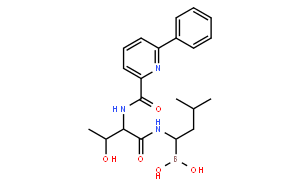| In vitro |
CEP-18770 demonstrates marginal prevention of the tryptic and peptidyl gultamyl activities of the protesome. The IC50 values of CEP-18770 are similar to those of bortezomib, with the chymotryptic and caspase-like activities being inhibited at low-nanomolar concentrations.[1] CEP-18770 inhibits A2780 ovarian cancer cells, PC3 prostate cancer, H460, LoVo colon cancer, RPMI8226 multiple myeloma cancer and HS-Sultan anaplastic non-Hodgkin lymphoma with IC50 values of 13.7, 22.2, 34.2 11.3, 5.6 and 8.2 nM, respectively.[1] CEP-18770 blocks the ubiquitin-proteasome pathway in several MM and in the chronic myelogenous leukemia cell line, K562. CEP-18770 causes an accumulation of ubiquitinated proteins over 4 to 8 hours with a profile similar to that observed after bortezomib treatment.[1] IκBα degradation is completely blocked by pretreatment with CEP-18770. CEP-18770 significantly inhibits high levels of NF-κB activity in both RPMI-8226 and U266 cells. The time- and concentration-dependent suppression of NF-kB DNA-binding activity in MM cell lines by CEP-18770 leads to a decrease of expression of several NF-κB-modulated genes mediating the growth and survival of tumor cells including IkBα itself, the X-chromosome-linked inhibitor-of-apoptosis protein (XIAP), the pro-inflammatory cytokines TNF-α and interleukin-1β (IL-1β), the intracellular adhesion molecule (ICAM1), and the pro-angiogeneic factor vascular endothelial growth factor. [1] The expression of these NF-κB–mediated genes and their modulation by bortezomib are associated with more favorable clinical responsiveness to this agent, highlighting their potential prognostic value in response to CEP-18770 exposure. [1] The proapoptotic activity of CEP-18770 against MM is not limited solely to tumor-derived MM cell lines, but extends to primary MM explants from relapsed or refractory patients including those previously treated with bortezomib. [1] In addition, the combination of CEP-18770 with melphalan or bortezomib produces synergistic inhibition of MM cell viability in vitro.[2]
|
| In vivo |
CEP-18770 reveals sustained dose-related relative tumor weight inhibition. CEP-18770 leads to dose-related complete tumor regressions, as compared to bortezomib treatment, which results in a 50% incidence of CR at its maximally tolerated dose (MTD) of 1.2 mg/kg intravenously. [1] In contrast to bortezomib, CEP-18770 reveals dose-related increase in the incidence of tumor-free mice by the completion of these studies (120 days after tumor transplantation). Oral administration of CEP-18770 produces a marked decrease in tumor weight and notable dose-related incidence of complete tumor regression with minimal changes in animal body weight over the course of the 120 day studies. [1]When compared to bortezomib, equiactive doses of CEP-18770 reveal a greater and more sustained dose-related inhibition of tumor proteasome activity, corresponding temporarily with maximum induction of caspase-3 and 7 activity.[1] The maximum apoptotic signal is 2.5 fold greater for CEP-18770 versus bortezomib. In contrast, proteasome inhibition profiles of CEP-18870 and bortezomib are comparable in the normal peripheral mouse tissues examined (liver, lungs, whole blood, and brain [no activity]) in both their magnitude and their duration.[1] No proteasome inhibition is detected in brain tissue at any time point for either CEP-18770 or bortezomib. In MM xenograft models, the addition of CEP-18770 to melphalan completely preventes the growth of both melphalan-sensitive or melphalan-resistant tumours. [1] The combination of CEP-18770 and bortezomib leads to complete regression of bortezomib-sensitive tumours and markedly delays progression of bortezomib-resistant tumours compared to treatment with either agent alone. Single agent CEP-18770 PO also shows marked anti-MM effects in these xenograft models[1]
|

 COA
COA MSDS
MSDS HPLC
HPLC NMR
NMR